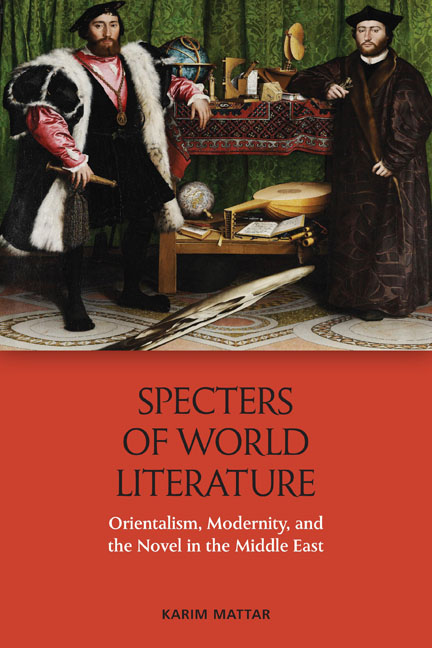Book contents
- Frontmatter
- Contents
- Preface
- Acknowledgments
- Note on Transliterations
- Introduction: Towards a Spectral Theory of World Literature
- I The Worlding of “Literature” in the Middle East
- II The Middle Eastern Novel and the Spectral Life-World of Modernity
- Conclusion: Futures of Spectrality
- Bibliography
- Index
Introduction: Towards a Spectral Theory of World Literature
Published online by Cambridge University Press: 20 October 2020
- Frontmatter
- Contents
- Preface
- Acknowledgments
- Note on Transliterations
- Introduction: Towards a Spectral Theory of World Literature
- I The Worlding of “Literature” in the Middle East
- II The Middle Eastern Novel and the Spectral Life-World of Modernity
- Conclusion: Futures of Spectrality
- Bibliography
- Index
Summary
No justice […] seems possible or thinkable without the principle of some responsibility, beyond all living present, before the ghosts of those who are not yet born or who are already dead, be they victims of wars, political or other kinds of violence, nationalist, racist, colonialist, sexist, or other kinds of exterminations, victims of the oppressions of capitalist imperialism or any of the forms of totalitarianism.
Jacques Derrida, Specters of MarxNo worker said it outright or pronounced his name out loud, but his specter filled the whole desert.
Abdelrahman Munif, Cities of SaltIn much of the contemporary critical debate on “world literature,” the onus in the compound has fallen on “world” rather than on “literature.” This is to be expected. After all, “literature” is a more or less transparent concept, whereas what is at stake in the discussion is the remit, scale, scope, objectives, and disciplinary dimensions of a literary studies expanded from the nation unto the “world.” This tendency is evident in the writings of David Damrosch, Franco Moretti, and Pascale Casanova, the “Holy Trinity”—to borrow Robert Young's ironic but affectionate quip about the founding figures of postcolonial studies—of world literature.
For instance, Damrosch opens What is World Literature? (2003)—the grouping's pivotal text—by abjuring any close and explicit attention to the concept of literature itself: “[i]n this book,” he explains, “I will have relatively little interest in attempting any firm definition of literature as such.” Damrosch suspends this question in order to facilitate his definition of world literature as “a subset of the plenum of literature,” and to thereby develop a groundwork for his now vastly influential theory of and methodology for a world literature that “encompass[es] all literary works that circulate beyond their culture of origin, either in translation or in their original language.” Intended at least in part to assuage anxieties about what would otherwise be the “sheer scope” of world literature among scholars, this theory and methodology proceeds by way of a series of spatial metaphors—most notably, that of “elliptical” or “double refraction”— that purport to describe the nature of the production, translation, circulation, and reception of works of literature in the world. In other words, it proceeds by way of a novel and sophisticated worldly cartography of an object that is by and large given or assumed.
- Type
- Chapter
- Information
- Specters of World LiteratureOrientalism, Modernity, and the Novel in the Middle East, pp. 1 - 68Publisher: Edinburgh University PressPrint publication year: 2020



